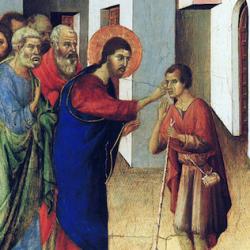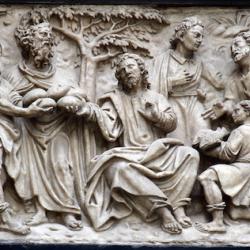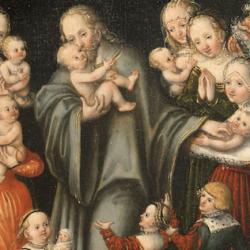In his long-anticipated and dramatically-completed (read the Preface) Echoes of Scripture in the Gospels, Richard B. Hays devotes a few pages to the parable of the vineyard as recounted in Mark 12. He observes, as every commentator does, that Jesus is the son who is finally sent to collect produce from the tenants who have charge of the vineyard.
Being Richard Hays, though, he hears more of the text’s music than most. He highlights the allusion to Isaiah 5, but notes that Jesus has changed the imagery: “We are still to understand that the vineyard is Israel, but the problem is different. The problem is no longer that the vineyard fails to produce grapes but rather that it is cared for by unscrupulous tenant farmers who refuse to give the vineyard owner his rightful share of the fruit” (41). That is: The owner sends servants to a fruitful Israel whose fruit is intercepted by the tenant/chief priests, scribes, elders before it can be delivered to the Owner. When judgment falls, it’s not because of Israel’s failure but because of the failure of her leaders.
And then Hays notices that the owner sends his “beloved son” (Mark 12:6), and that sends him off to the book of Genesis. Isaac is Abraham’s beloved son, and “by employing the loaded epithet ‘beloved son,’ Mark causes the story of the sacrifice of Isaac to echo in the background of Jesus’ parable, with the effect that the murder of the vineyard owner’s son is not necessarily only a grim ending to the tale—death is not necessarily the final word” (43). We may import the figural reading of the Aqedah in Hebrews 11: Isaac is a type of resurrection, and the fact that the son who comes to the vineyard dies as a “beloved son” hints that he will be raised.
Joseph too is a beloved son, attacked by murderous brothers. “Come, let us kill him,” spoken by the tenants in Mark 12, occurs only in Genesis 37:20 in the LXX, the words of Joseph’s brothers: “A reader who hears this fleeting echo might recall that Joseph was thrown into a pit by his brothers but later rose to rule over all the land of Egypt and to provide saving aid for his family in a time of famine. This figurative ‘resurrection’ of Joseph also foreshadows Jesus’ fate’ (43). Jesus ends the parable quoting Psalm 118, which Hays connects with the Joseph story: “In the light of the resurrection, the killing of the beloved son becomes a part of the larger drama of human rejection and divine vindication, a drama already prefigured in the Joseph story and in Psalm 118” (44).
And more: The Joseph story is a story of ultimate regathering. The very brothers who intended to kill him and did send him into slavery were regathered to the beloved son in Egypt. So there is hope for the vineyard owners. Even after they have slain the beloved Son, they might be cut to the quick by Peter’s preaching, so that many of the priests also believe. Fruitful Israel will be placed, Jesus says, in the hands of faithful caretakers; and some of those faithful caretakers will be those who once attacked the Son.















